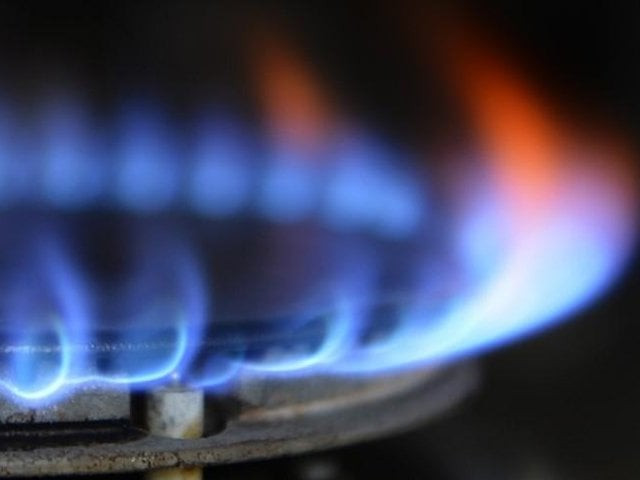ECC okays 190% hike in gas prices
Also increases electricity prices by Rs1.5 per unit

PHOTO: FILE
The Economic Coordination Committee (ECC) of the Cabinet took these decisions that will be enforced from July 1, as has been agreed with the IMF. The IMF Executive Board has called a meeting on next Wednesday to approve Pakistan’s request for $6 billion bailout package.
It is the second time in this fiscal year that the Pakistan Tehreek-e-Insaf (PTI) government has increased prices of both electricity and gas. The maximum burden has been put on the middle and upper middle income groups whose disposable incomes have already shrunk due to increase in taxes and stagflation.
The government has reduced the average monthly gas bill of the richer person by 64% and the richest class by 19% by allowing them benefit of the last gas tariff slab. As part of the IMF condition, the State Bank of Pakistan (SBP) also devalued local currency to an all-time low of Rs161.5 to the US dollar in the inter-bank market on Wednesday. The currency depreciated by Rs4.5 in a single day.
The ECC also approved to exempt the $3.2 billion oil deal with Saudi Arabia from the scope of Public Procurement Regulatory Authority (PPRA) – paving way for start of oil and LNG supplies on deferred payments from next fiscal year.
But the body deferred a decision on Rs200 billion fresh borrowings through domestic Sukuk to pay off circular debt, as it sees improvement in cash flows of power sector after increase in electricity prices.
Tariffs hike
The ECC approved to increase the electricity and gas tariffs aimed at bringing their cost to recovery level. The gas consumers will pay additional Rs145 billion excluding the increase in General Sales Tax (GST) collection due to high prices. By adding the GST impact, gas consumers will be coughing up Rs170 billion.
The Oil and Gas Regulatory Authority (Ogra) had determined the revenue requirement for the Sui Northern Gas Pipelines Limited (SNGPL) at Rs293.3 billion and for the Sui Southern Gas Company (SSGC) at Rs270.8 billion for the next fiscal year. But at the existing rates, the SNGPL was facing Rs87.6 billion shortfall and the SSGCL Rs56.8 billion shortfall, which will be bridged after the fresh increase.
Similarly, the electricity consumers will pay extra Rs190 billion, excluding the GST increase. After adding the GSP impact, the total additional impact on power consumers will be Rs222 billion. In total, the gas and electricity consumers will pay Rs391 billion in next fiscal year 2019-20.
The ECC approved to increase the electricity prices by Rs1.494 per unit on account of ‘quarterly adjustments’. “The National Electric Power Regulatory Authority (Nepra) had recommended the increase in prices, which the ECC approved,” said a senior official of the Power Division.
This will help the power distribution companies to collect Rs189.6 billion, excluding the GST.
Out of Rs189.6 billion, the Finance Ministry spokesman Dr Najeeb Khaqan said that in the first year, the government will pick Rs50 billion on account of no increase in prices for consumers of up to 300 units. The government has already decided to withdraw Rs3 per unit industrial support subsidy.
This is second time that the PTI government has increased the electricity tariff during the ongoing year. Last time, it increased power tariff by average Rs1.27 per unit in January 2019. The lifeline consumers up to 50 units per month would be exempted from the price hike.
The ECC also approved up to 190% increase in gas prices with effect from July –also second time within a year. The ECC approved the summary of the Petroleum Division with a slight modification on reducing the increase in gas prices for industrial consumers on account of Gas Infrastructure Development Cess.
It decided to keep the gas prices unchanged for consumers using less than 50 cubic meters at Rs121 per million British thermal unit (MMBTU) and its monthly bill will also remain unchanged at Rs285.
The price for second slab comprising up to 100 cubic meters has been by 190% to Rs369 per unit, from Rs127 per unit. The bill of this slab will go up by Rs361 or 63% to Rs933 per month from Rs572.
The tariff for third slab comprising 200 cubic meters users has been increased by 109% to Rs553 per unit from Rs264. This would result into a monthly bill of Rs3,872, up by 68% from Rs2,305 per unit.
The price for fourth slab of up to 300 cubic meters has been increased by Rs168% to Rs738per unit form the existing rate of Rs275. The monthly bill of this category will jump up by 122.8% or Rs4,406 to Rs7,995. This category of consumers will face the highest increase in their monthly bills.
The gas rate for fifth slab of 400 cubic meters will increase by 42% to Rs1,107 per unit from Rs780. The bill for this category will increase by about 6.4% to Rs14,373 per month from Rs13,508.
The ECC approved to increase the sixth slab price of above 400 cubic meters by only 1% and its monthly bill will be reduced by Rs6,039 or 19% due to benefit of the last slab rate. The ECC approved to keep rates unchanged for bulk domestic consumers at Rs780 per unit.
It also approved to increase gas prices for feedstock for old fertilizer to Rs300 per unit from Rs185 –an increase of 62%. It increased prices for fertilizer fuel, power, cement, general industry, captive power plants, zero rated industry, CNG and commercial consumers by 31%.



1733130350-0/Untitled-design-(76)1733130350-0-208x130.webp)















COMMENTS
Comments are moderated and generally will be posted if they are on-topic and not abusive.
For more information, please see our Comments FAQ